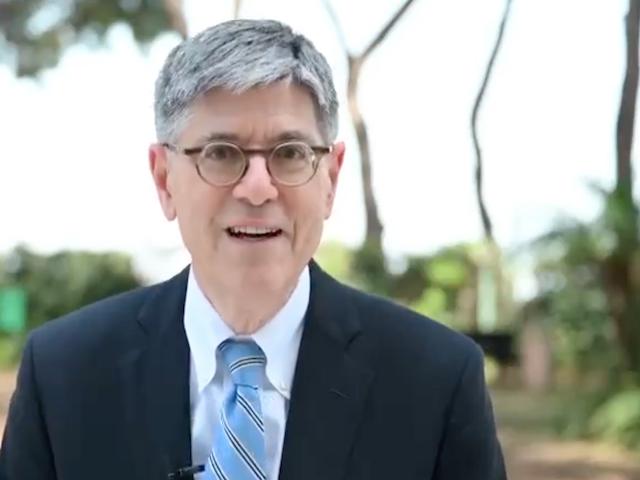In a compelling address at the Calcalist and Bank Leumi’s National Economic Conference, U.S. Ambassador to Israel Jack Lew delved into several pressing issues with a sense of urgency and determination, emphasizing the critical nature of ongoing negotiations with Hamas and the broader implications for regional security.
Ambassador Lew highlighted the paramount importance of achieving a ceasefire and securing the release of hostages, marking these objectives as top priorities for both the United States and Israel. "To me, the urgency begins with the human lives that are at stake. There’s not an infinite amount of time. Time is not a friend to the process's side, so we can’t let up in any way," Lew declared emphatically. He further underscored that a ceasefire in Gaza is crucial for preventing further escalation in the North with Hezbollah. "If there is going to be a diplomatic breakthrough in the North, having a period of quiet related to a ceasefire and a hostage release is crucial,” he added, highlighting the broader implications for regional stability.
The Ambassador candidly acknowledged the complexity of the situation, stating, “I can't sit here today and tell you that it is a day or two away. There are tough discussions, the negotiations must continue, and flexibility will be required from all sides, while basic principles need to be maintained." This recognition of the delicate and intricate nature of the negotiations underscores the importance of persistent and strategic diplomatic efforts.
ג'ק לו, שגריר ארה"ב בישראל, בוועידה הכלכלית הלאומית: "נורמליזציה עם סעודיה היא נושא חשוב לאזור ולבטחון ארה"ב. זה לא השתנה אחרי 7 באוקטובר, ראינו את החשיבות של בריתות אזוריות ב-14.4 (ליל המתקפה האיראנית). יש עדיין דרך להשלים את המגעים בנושא"
— כלכליסט | Calcalist (@calcalist) July 15, 2024
On the subject of normalizing relations with Saudi Arabia, Ambassador Lew expressed a realistic yet hopeful perspective. “The path ahead is challenging, it’s going to require hard decisions about how to deal with the challenge of Palestinian self-governance. It’s not something that can be resolved if that issue is just put to the side. On the other hand, it has to be resolved in a way that protects Israel’s security,” he explained. He emphasized that, despite the difficulties, the potential for Israeli-Saudi normalization remains open and achievable. “I think there is a way to get the negotiations with Saudi Arabia completed. Would it have been better if it could have been completed earlier? Of course. But that doesn’t mean that the pathway doesn’t remain open."
Ambassador Lew highlighted the increasing necessity for Israeli-Saudi normalization, particularly in light of recent events. "The need for strategic cooperation in the region has only grown since October 7. If we needed to be shown what the value of strategic cooperation is, we saw it on April 14th with Iran’s missile strike against Israel playing out in real life in real time,” he asserted, drawing attention to the pressing geopolitical realities.
As I stated during the Herzliya Conference this evening:
— Ambassador Jack Lew (@USAmbIsrael) June 24, 2024
"Strategically, if there were a hostage deal, and there was a ceasefire, it would open a doorway to a discussion with Hezbollah and Lebanon about avoiding a war, it would open the doorway to finishing the normalization… pic.twitter.com/MjeWEMNQ0b
In his address, Ambassador Lew also tackled the business community's perceptions of Israel, reinforcing the nation's significant role in the global economic landscape despite the current challenges. His remarks painted a picture of a nation steadfastly navigating complex political and economic terrains, all while striving for peace, security, and prosperity.
The implications of Ambassador Lew's speech for regional security are profound. The successful negotiation of a ceasefire with Hamas and the release of hostages could significantly reduce tensions in the Gaza Strip and prevent the conflict from spilling over into other areas, particularly the North, where Hezbollah poses a constant threat. Additionally, the normalization of relations with Saudi Arabia could reshape the geopolitical landscape, fostering greater cooperation and stability in a region fraught with historical tensions and conflicts.
US ambassador to Israel Jack Lew said that "the normalization with Saudi Arabia is extremely important, the settlement with the Palestinians cannot be ignored in order to move on and bring peace to the region. An agreement with Saudi Arabia would be a defeat for Hamas and Iran."…
— Marc Zell (@GOPIsrael) June 25, 2024
In summary, Ambassador Lew's address not only highlighted the immediate and pressing concerns of ceasefire negotiations and hostage releases but also pointed to broader regional security dynamics. The potential normalization of relations with Saudi Arabia, coupled with strategic cooperation among regional players, could pave the way for a more stable and secure Middle East.


